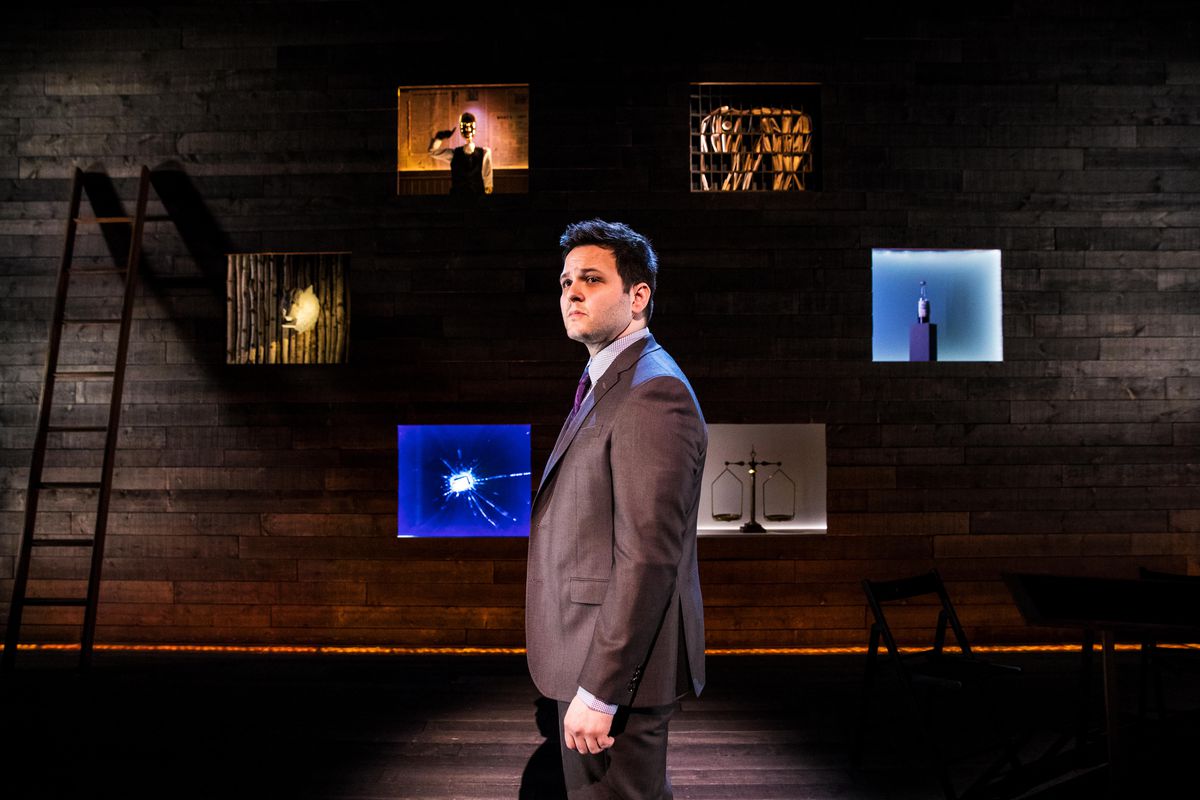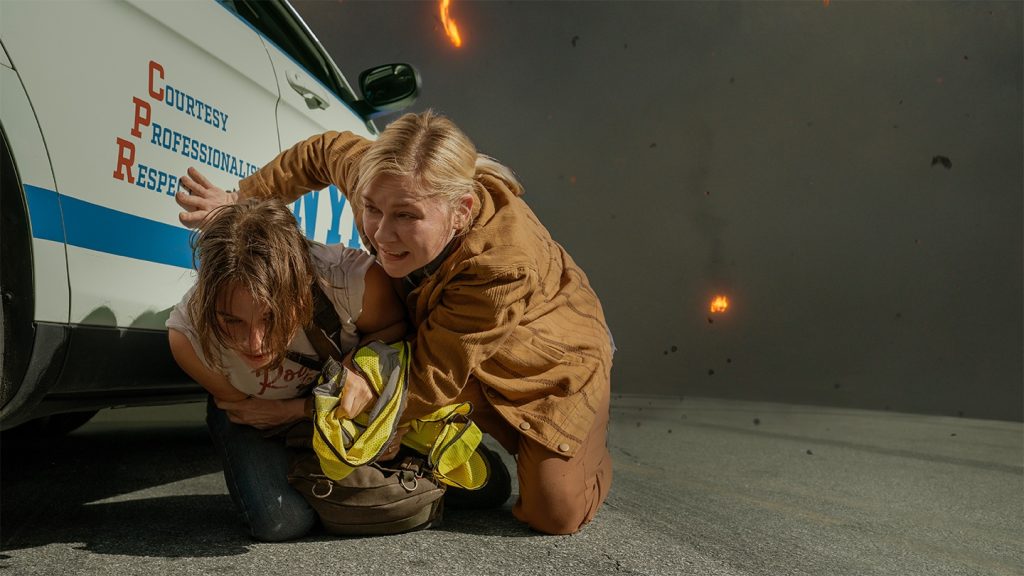“God, I miss live theater.” A lot of emotions–the big sloppy kind–washed over me as I watched Derek DelGaudio’s In & Of Itself. But the one that hit me hardest might have been just how keenly all this quarantining makes me miss the magic of sharing a theater space with a captivated audience and a showman who knows how to make us hang on his every word. This documentary recording of DelGaudio’s Broadway production offers various jaw-dropping displays of “magic.” Yet, the most impressive is how director Frank Oz translates this theatrical experience to screen without losing that crucial and coveted sense of atmosphere.
To be clear, I never saw this one-man-show on Broadway. Even watching the trailers and reading the promo material, I had little to no idea what was in store. DelGaudio is billed as a “Conceptual Magician,” and my first thought was: What the hell does that mean? Having now seen his show, I can understand the ambiguity of In & Of Itself‘s promotional team, because there is no easy answer. What DelGaudio does within this 90-minute performance is a blend of storytelling, sleight of hand, and self-help seminar. But that ruthlessly simplistic description fails to encompass the grandeur this combination brings to a small stage with just the help of a few key props and an engaged audience.
The show–and its documented performance–begin before DelGaudio steps on stage. In the lobby, a wall of labels invites audience members to choose a term that relates to them. These labels will be torn in half by an usher, as if their self-assessment is their ticket in. Then, their chosen descriptor is stacked with all others and placed on a table on stage, a sophisticated Chekov’s gun device. We don’t know what part they will play, but we know it will be pivotal.

I won’t spoil the surprises DelGaudio has in store, so let’s move onto the man himself. At first glance, he is a wholly unremarkable, save for his precisely tailored three-piece suit. Imagine Jimmy Kimmel minus the razzle-dazzle talk-show persona. Neither is there anything flashy in the way DelGaudio talks; his tone is dedicatedly sober and soft. When he tells a joke, he delivers the punch line so flatly that you might well wonder if he realizes it’s funny. Though Oz shot several performances of the 552 that played, he includes takes where DelGaudio stumbles as he speaks. This is not the precise showmanship and blaring confidence we’re used to seeing from stage magicians. Yet this is not a deficit of DelGaudio’s, merely a distinction.
For all this solemnity and almost defiant blandness, DelGaudio is absolutely captivating. It took me a while to put my finger on why. Perhaps part of it is how he’s knowingly subverting audience expectation of magician bravado. However, the core of it is how vulnerable he is from the moment he softly strides on stage. This softness defines all that follows, as he tells us a preposterous but powerful tale of a reckless roulettista, the meaning behind a golden brick, and fables about dogs, wolves, and an ill-treated elephant. DelGaudio speaks to a packed house as if he’s whispering secrets under moonlight. So fragile are they–or are we–that such things can only be told when we can’t fully see each other’s faces. Except here we can. DelGaudio lays his soul bare onstage, inviting audiences to gawk, judge, and then reflect as he turns the spotlight back onto them.

To present how the show changes night-to-night depending on its audience, Oz eschews the pretense of this being “one” performance. Montages are created that bleed together several showings, displaying a wide array of audience responses, including surprising cameos from the likes of Tim Gunn, Larry Wilmore, and Bill Gates. To make us feel a part of the crowd, Oz offers some shots that have obstructed views, specifically the intruding heads of audience members sitting before us. Then, he’ll leap closer than any of this in-person audience can get, sweeping into close-ups of DelGaudio’s face, earnest, ardent, and professing with every pore. This tapestry of cinematography knits together so snugly that we feel as if we truly are in the thick of that room – so much so that when the house lights go down, your flesh may goose-pimple as the temperature drops. You don’t just hear the hush of the audience, holding their breath for the next revelation. You realize you’re holding your breath too, in perfect syncopation with this communal experience superbly captured.
Within this sensational brand of showmanship, DelGaudio draws portions of his past, creating a map he invites us to fill in to better understand him, and perhaps ourselves. Identity is the core of his conceptual show, both who we are to ourselves and each other. Each bit builds to a finale that is emotionally rattling, yet tritely sentimental. After all the sophisticated theatrics, his grand thesis feels a bit cheap, a message that could be summarized on a bouncy bumper sticker or a teabag’s florid tag. Nonetheless, this finale is riveting. It’s a sequence so long that it should get old. By this point, however, we are one with this room. We feel the connection to this moment so keenly, as Oz guides us from the magician to the tear-rimmed eyes of his audience and back again. It’s an exchange electric with vulnerability and acceptance. Perhaps it is felt even more keenly now because we can’t be near so cavalier about sharing a space safely and joyously with so many strangers.
Great theater is not just razzle-dazzle, but alive. Even though you know there is a script, rehearsals, blocking, and myriad of meticulous machinations that bring this big show to life, there’s a titillating tension in the potential to see something unique that no other performance might offer. When we go back to a movie, it’s the same, but our view of it may change as we do. A live theater production exists in a moment, full of infinite possibilities, and can never truly be recreated. Working in intense audience involvement, DelGaudio assures spontaneity and originality each night. With this documentary film, Oz gives us a long, luxurious suckle of this sensation through a thoughtful covering of In & Of Itself. In the end, we’re given not only a good show, but also the kind of escape that is pure theater. The accomplishment of such a feat would always be laudable, but right now, it feels like a goddamn miracle.
A
“Derek DelGaudio’s In & Of Itself” streams Friday on Hulu.



